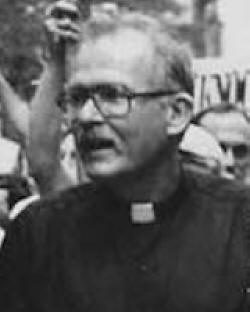

Queer Places:
204 Albion Ave, Park Ridge, IL 60068
Woodstock Jesuit community, 220 W 98th St, New York, NY 10025
 Robert
Earl Carter (July 27, 1927 – February 22, 2010), a Jesuit and early leader of Dignity and the National Gay Task Force, was born in Chicago on July 27, 1927, the son of Earl
W. Carter and Ila Grace Smith. His father managed several music stores. The Carters were Protestants who worshipped in different traditions.
Robert Earl Carter grew up in Lakewood, Ohio, and later Park Ridge, Illinois.
Robert
Earl Carter (July 27, 1927 – February 22, 2010), a Jesuit and early leader of Dignity and the National Gay Task Force, was born in Chicago on July 27, 1927, the son of Earl
W. Carter and Ila Grace Smith. His father managed several music stores. The Carters were Protestants who worshipped in different traditions.
Robert Earl Carter grew up in Lakewood, Ohio, and later Park Ridge, Illinois.
Carter received a scholarship to the University of Chicago in 1943. He wrote a review of a Tennessee Williams poem for the school paper, The Maroon, and was invited to the opening of Williams' new play, The Glass Menagerie, in December, 1944. A week later Carter conducted possibly the first published interview with the largely unknown Williams and they became lovers for a short period. Carter wrote much later, "He may have thought he seduced me, but he didn't or at least gets only half the credit."
Carter became interested in Catholicism, partly through reading James Joyce's Portrait of an Artist as a Young Man. Joyce helped him recognize "the centrality of Catholicism in the history of Western civilization." He graduated in June, 1946, and the next day converted to the Catholic Church. He continued graduate work at the University of Chicago earning a master's degree in Greek and a Ph.D. in 1953. He entered the Society of Jesus in 1954 and was ordained in 1963. He taught classics and became a leading scholar on John Chrysostom.
With fellow Jesuit John McNeill, Father Carter hosted the first meeting of Dignity New York at the chapel of their Woodstock Jesuit community on W. 98th Street in Manhattan in 1972. In an unpublished memoir, Carter wrote of that first meeting, "There were about 15 present. I remember walking to the meeting and wondering with some trepidation what I was getting myself into." Carter became one of the group's board members and theological advisers. "No longer was I just the professor of Early Church Studies and a research scholar. Now I was giving hope and new life to many gay Catholics," he wrote.
After marching with Dignity in the 1973 Gay Pride March in New York, Carter was invited by Howard Brown, then City Health Commissioner who had just come out publicly, to become a charter member of the board of the National Gay Task Force. Carter had concern about becoming the first Catholic priest to come out in this way, but recalled, "I was utterly convinced that the only way gays and lesbians were ever going to be accepted socially was if they made themselves known publicly."
The New York Times ran a story on the formation of the Task Force which included: "A number of homosexual and lesbian organizations were represented on the board. One member was the Rev. Robert Carter, a Jesuit priest and professor of historical theology at the Jesuit seminary here." Soon thereafter Carter was visited by a subprovincial of the Jesuit order. Apparently a number of persons were calling for his expulsion from the order. However, Carter was not disciplined after explaining that he believed he was acting in the true spirit of Jesus by coming out and working with people rejected by society.
Carter became an active leader in the Task Force as well as Dignity. He circulated in bars raising funds for the Task Force. He marched in Pride parades in his clerical collar. He led and preached at Dignity Masses. He assisted lobbying efforts for New York City's gay rights ordinance, including testifying at City Council hearings, until it passed in 1986. Colleague John McNeill was quoted," I refer to him as the heart of Dignity. I was doing the writing, but he was on the front line, meeting with people, counseling people."
Carter went back to school to earn a Master's in Social Work from Columbia in 1981. By 1985 he was counseling AIDS patients at Lincoln Hospital in the Bronx and later became a supervisor of the outpatient AIDS program at the Bellevue Hospital Center in Manhattan.
When Church authorities banned Catholic institutions from allowing Dignity to meet on their premises, Carter celebrated Mass in apartments around New York and led blessing ceremonies for gay couples. When Carter was barred by his provincial from saying Mass for Dignity, he traveled frequently to Philadelphia to say Mass for the chapter there--which was outside his provincial's jurisdiction.
Father Carter wrote in his memoir: "Since Jesus had table fellowship with social outcasts and sinners, those rejected by the religious establishment of this time, I consider myself to have been most fully a Jesuit, 'a companion of Jesus,' when I came out publicly as a gay man, one of the social rejects of my time. It was only by our coming out that society's negative stereotypes would be overcome and we would gain social acceptance."
Father Carter died on February 22, 2010, at his residence at Fordham University in the Bronx.
My published books: